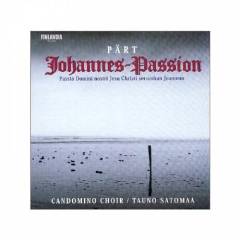Arvo Part - St. John Passion (Johannes Passion) [2001]
Arvo Part - St. John Passion (Johannes Passion) [2001]

01. Choir Passio Domini Nostri Jesu Christi
02. Jesus Dixi Vobis Quia Ego Sum
03. Jesus Ego Palam Locutus Sum Mundo
04. Evangelist Et Misit Eum Annas Ligatum
05. Pilate Quam Accusationem Affertis Adversus
06. Jesus Regnum Meum Non Est De Hoc Mundo
07. Pilate Ecce Adduco Vobis Eum Foras
08. Evangelist Et Exinde Quaerebat Pilatus
09. Jesus Mulier Ecce Filius Tuus
10. Choir Qui Passus Es Pro Nobis
Candomino Choir
Tauno Satomaa – conductor
Written in 1982, this work represents Arvo Pärt's late style, whose central elements are medieval and Renaissance modes and triads. Its static quality, narrow melodic compass, and repetitiousness make the music an acquired taste. But its monastic austerity, solemnity, and stark simplicity seem to offer an oasis of calm in a restless world. Those who associate the "Passion" with Bach's version are in for several surprises. Pärt uses the familiar text but in Latin, which has the effect of putting listeners at a distance from the events described. The Evangelist's narration is delivered by four soloists, alternately or together; the part of Pilate is given to a tenor; the Chorus represents the multitude as well as certain characters; and the accompanying group consists of instrumental soloists. Only Jesus remains a baritone.
The piece begins, and essentially remains, in A minor, revolving around and returning to the A minor triad. The rhythmic motion is consistently in unison; there is no counterpoint or independence of voices. Contrast is created by changes in vocal register and instrumental timbre. The music is slow and homophonic; motion and dissonance are reserved for climactic moments: the striking of Jesus, the flagellation, and especially the Crucifixion. Pilate's lyrical tenor voice adds fervor to his pleading for Jesus and his refusal to pass judgment on him, thus reinforcing the old contention that St. John's Gospel is tainted by anti-Semitism. Jesus' words upon the cross have an otherworldly feeling; the piece ends with his death on a sudden, brilliant D major chord. The performance could not be better. The singers are all splendid, and Jorma Hynninen as Jesus makes one wish to hear him in Bach's Passions. ---Edith Eisler, Editorial Review
download (mp3 @320 kbs):
yandex mediafire mega uloz.to 4shared cloudmailru gett hostuje
Last Updated (Sunday, 01 October 2017 12:39)








